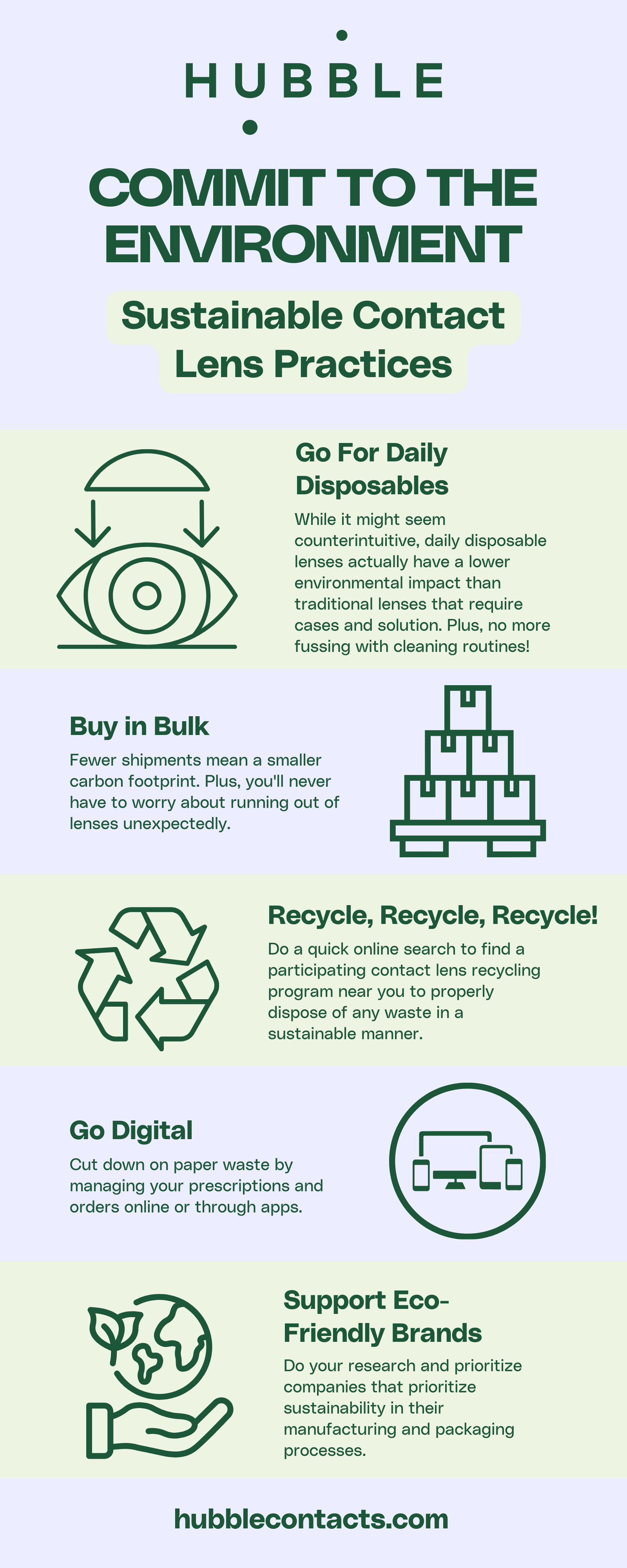The Environmental Impact of Contact Lenses and Sustainable Practices
As convenient and life-changing as these little vision-correcting discs are, have you ever stopped to think about their environmental footprint of contact lenses? With 45 million Americans wearing contact lenses, it's essential to our environment to ensure that all of these lenses are disposed of in the most eco-friendly manner. And, when it comes to your daily disposable lenses, you may further question the lasting consequences of discarding contact lenses following a single use. Contact lenses, in addition to water content and hydrogel content, are made of water-based plastics—plastics that if not addressed on how to dispose of properly will cause some harm to the environment.
Hubble Contacts continues to revolutionize how contact lenses can be made with the eco-conscious user in mind with eye care products that produce less waste that end up in landfills. Sustainability is part of Hubble’s commitment with Hydro by Hubble, dailies that feature the slimmest contact lens packaging in the world: less waste, less plastic, more convenience. Additionally, contact lenses are made more sustainable by companies that allow for the return of contact lenses via a shipping program to recycle or dispose of lenses. Keep reading to learn more about contact lenses and the environment.
Understanding the Environmental Impact of Contact Lenses
Are contact lenses bad for the environment? While contact lenses can contribute to environmental pollution if they are not disposed of properly, there are solutions available for the environmentally conscious. You might be interested to know that “the overall environmental impact of waste generated through the use of contact lens products by the end consumer is insignificant (0.5%) compared with the amount of waste generated in…everyday life” according to the National Library of Medicine.
That being said, most contact lenses are made of plastic materials that do not biodegrade easily. When flushed down the toilet or discarded improperly, contact lenses can end up in water bodies, where they can harm aquatic life and contribute to microplastic pollution. Who among contact lens users has not lost a contact accidentally by slipping down the sink? That lost contact lens, amassed with thousands more, will have a cumulative effect on the water supply.
Additionally, the packaging of contact lenses, such as blister packs and plastic containers, also adds to plastic waste if not recycled correctly.
To mitigate the environmental impact of daily contact lenses, it's essential to dispose of them properly by following the guidelines provided by contact lens manufacturers or recycling programs. Some brands offer recycling programs where you can send back used contact lenses and packaging for recycling. Additionally, switching to daily disposable contact lenses can reduce the accumulation of plastic waste associated with long-term wear lenses, which includes contact lens solution.
The Carbon Footprint of Contact Lens Production
Have you ever wondered about the journey your contact lenses take before they finally make it onto your eyes? From the raw materials to the intricate manufacturing process, there's a whole world behind the steps to correct your vision.
Most conventional lenses are made from polymers like silicone hydrogels, which allow oxygen to pass through to your eyes while remaining durable and flexible. But here's the catch – these polymers are typically derived from non-renewable sources like petroleum and natural gas. Not exactly the greenest option, right?
Some forward-thinking companies are already exploring more sustainable alternatives. One exciting development is the use of plant-based polymers derived from renewable sources like corn, soy, or even algae. These bio-based materials have a much lower carbon footprint and can even be biodegradable in some cases.
Manufacturing contact lenses require water, chemicals, and packaging materials, all of which contribute to the environmental footprint.
Once the lenses are produced, they need to be packaged and shipped to your local eye care provider or directly to your doorstep. This is another area where companies are getting creative with sustainable solutions. From using recycled and recyclable materials for packaging, like Hubble, to optimizing shipping routes to reduce emissions, every little bit counts.
Eco-friendly Alternatives and Sustainable Practices in Eyecare
Are daily contacts bad for the environment? Daily disposable contact lenses can have a significant environmental impact due to the increased frequency of waste generation associated with their use. However, Daily disposable lenses produce around 1kg of plastic waste per year from the lenses and packaging, compared to 0.87kg for reusable monthly lenses plus solution bottles.
Daily disposable contact lenses typically come in individual blister packs or other packaging materials. Each time a new pair of lenses is used, the packaging becomes waste. Multiply this by the number of wearers using daily disposables, and it can contribute to a considerable amount of plastic waste.
Unlike longer-wear prescription contact lenses, which are typically replaced less frequently, daily disposables are discarded every day. But again, while daily lenses create slightly more plastic waste than monthly lenses, they eliminate the need for solution bottles which have a larger environmental impact. Many users may not be aware of sustainable contact lenses, proper disposal methods, or recycling options for contact lenses and their packaging, leading to improper disposal and increased environmental impact.
Recycling Programs: A Step Towards Sustainability
A simple way to relieve the environmental impact of contact lens use is by collecting used contact lenses and packaging to prevent them from ending up in landfills or water bodies. By recycling contact lenses and their packaging, materials can be repurposed or properly disposed of in an environmentally responsible manner.
Efforts to promote responsible disposal practices and the development of more sustainable materials and packaging for contact lenses can help mitigate the environmental impact of contact lens use. Some local optometry offices and eyewear retailers may offer contact lens recycling programs or serve as drop-off locations for recycling used contact lenses and packaging. These programs may vary by location, so it's worth checking with your local eyecare provider.
Here is a short list of other Contact Lens Recycling Programs.
Bausch + Lomb ONE by ONE Recycling Program - Bausch + Lomb offers a program in partnership with TerraCycle called "ONE by ONE" that allows users to recycle used contact lenses, blister packs, and top foil from any brand. Users can collect their used contact lenses and packaging, then ship them to TerraCycle using a free shipping label provided by Bausch + Lomb.
Acuvue Contact Lens Recycling Program - Acuvue, in partnership with TerraCycle, offers a recycling program for used contact lenses and blister packs. Users can collect their used contact lenses and packaging, then ship them to TerraCycle using a free shipping label provided by Acuvue.
Making an Informed Choice: Sustainable Contact Lenses
The most sustainable options for sustainable contact lens use and care appear to be daily disposable lenses from brands using minimal recyclable packaging and offsetting their carbon footprint. Biodegradable plant-based lens materials are also in development. A year's supply of daily disposables uses around 11 grams of plastic, compared to bottles of solution and lens cases needed for reusable lenses.
Look for lenses with minimal plastic blister packaging like Hydro by Hubble and eye care products made by brands using sustainable materials or that make efforts to offset carbon emissions for a more eco-conscious choice.
Hubble's Commitment to the Environment
In addition to Hydro by Hubble featuring environmentally conscious packaging and design, Hubble is committed to being a green partner to the planet. Hydro by Hubble contacts features the slimmest contact lens packaging in the world, with less waste, less plastic, and more convenience.
Hubble also focuses on providing quality eyewear, made with sustainability in mind. You can choose from a line of eye care that includes Frames by Hubble as well. Eyeglasses and sunglasses are an easy choice for a more eco-conscious focus for eyewear that boasts a less wasteful replacement schedule.
Empowering Consumers: How You Can Make a Difference
You can empower yourself as an informed consumer of contact lenses and related products and explore some simple yet impactful ways to be more eco-conscious while still enjoying the freedom and flexibility of contacts.

Go for daily disposables - While it might seem counterintuitive, daily disposable lenses have a lower environmental impact than traditional lenses that require cases and solution. Plus, no more fussing with cleaning routines!
Buy in bulk - Fewer shipments mean a smaller carbon footprint. Plus, you'll never have to worry about running out of lenses unexpectedly.
Recycle those cases and foil covers - Many contact lens brands offer recycling programs specifically for this type of waste. Do a quick online search to find one near you.
Go digital with your prescriptions and orders - Cut down on paper waste by managing everything online or through apps.
Support eco-friendly brands - Do your research and prioritize companies that prioritize sustainability in their manufacturing and packaging processes.
Your Vision, Our Planet's Future: Together with Hubble Contacts
A few simple tweaks to your contact lens routine can make a world of difference for our planet. Making environmentally conscious choices when it comes to your vision and eye care needs can be effortless. Selecting from sustainable packaging of contact lens products, including seeking materials in eyecare products that require less carbon footprint in their creation or transporting. Proper disposal and recycling practices, as well as sustainable manufacturing and material choices, are essential for mitigating the environmental impact of contact lenses.
Explore Hubble's sustainable product offerings, including Hydro by Hubble, our signature contact lenses with packaging that benefits the planet while helping you to see better.



